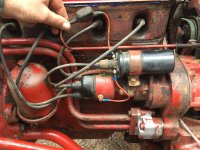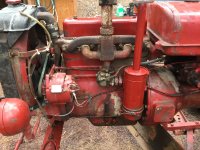jeffgreef
Silver Member
- Joined
- Jul 20, 2009
- Messages
- 184
- Location
- Plumas County, California
- Tractor
- Farmall, Gibson, Windolph, Simar, Bear Cat, Vaughan, Howard


 Got an electrical problem, have no experience sleuthing DC vehicle electrical problems. I do have a volt/amp meter. This is for my 1950 Super A.
Got an electrical problem, have no experience sleuthing DC vehicle electrical problems. I do have a volt/amp meter. This is for my 1950 Super A.When I bought it recently, the previous owner told me that it was necessary to disconnect the battery after every use or else the battery would run down. Also, he said that he thought the starter motor was going bad because it was cranking slowly. And, I noticed that the amp meter never moves.
As you see from the pics, a 6 volt alternator was installed. I've confirmed that the battery is 6 volt.
The slow cranking starter could be a low battery or it could be undersized battery cables which look to me like standard auto 12 volt sized cables.
Why would the amp meter not move at all? How do I tell if it is broken? I read somewhere that some replacement meters are, in that person's opinion, poor quality. Are there better and worse ones around?
How would you go about sleuthing the gradual discharge of the battery? I think one person suggested it may have to do with diodes in the alternator.
Got the battery on a trickle charger now, it's showing exactly 6 volts. My volt meter measures amperage and resistance.